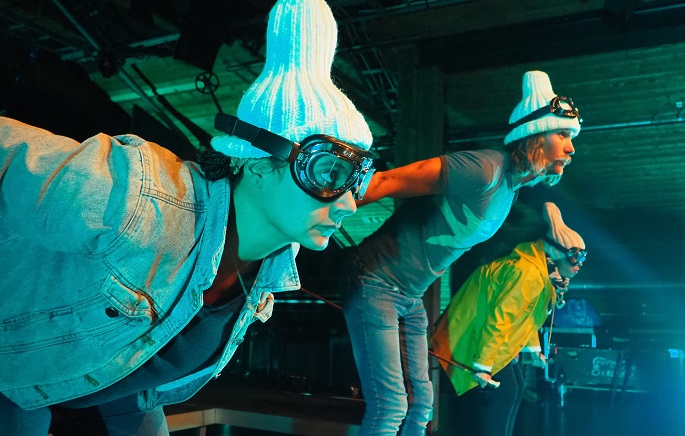There's nothing absurd about Suksitango
Published : 30 Sep 2020, 13:03
Have you ever tried to dance tango? Have you ever tried to dance Finnish tango? Have you ever tried to dance Finnish tango while wearing skis? This is the paradox of the surreal play so masterfully directed, co-written, and co-acted by Jukka Toivonen.
There's nothing absurd about the story and there's nothing absurd about the genre. The plot is quite clear and there's no existential meaninglessness in the dialogues, quite the opposite. The main characters, two musicians who have found each other at a language class for foreigners in Finland, are not in search for the meaning of life. They're dealing with something as real as cultural shock, heartbreak, fear of the unknown, and the very mundane issue of how to get their band a paid gig in some place other than Lapland.
Technically, the use of surrealism is a suitable choice to portray the inarticulable emotions the characters are experiencing, and quite clever for a low budget production. This is what creativity and resourcefulness look like, let's not mistake the container for its contents.
"Emotional hyperrealism" is the word, as the play zooms in on every intensely uncomfortable detail the characters experience in Finnish society. So much so that it becomes funny for those who understand and embarrassing for those who pretend they don't.
But the director has done his homework and he spares us nothing. He carries the show by playing seven different characters portraying Finns, well integrated immigrants, and mythological figures all resembling each other in vibrational hysteria. He's brilliant, like something right out of "Tatu ja Patu".
Jukka's energy is exquisit and his commitment on and off stage completely shatter the stereotype of the Finnish man who feels and says nothing. One of the marks of a great leader is the ability to listen, serve, and support. And this man has done it all.
Co-stars Anna Haukka and Ilaria Tucci just shine. These women are experienced professionals, with a prestigious education respectively in Russian and Italian theater traditions. Both talented musically and in energetic stage presence, they are equals each in their own right and they create a glorious collision of pathos. The friendship feels authentic. Very touching performances.
Last but not least, the role of the adjuvant is interpreted by the renouned Estonian musician Silver Sepp, who quietly and unpretentiously steps in and out of the small stage of Telakka like a caucasian Christ-like figure who plays unusual instruments made out of pieces of wood and nails. "Outo" is the name. A lesser type of Jesus who is not so skilled when he "takes the wheel", but who can definitely change the athmosphere with his presence.
This is a play about foreigners living in Finland and I loved it.
Congratulations to the talented producer Anita Parri for making wise choices behind the scenes. Great staging and lights by Perttu Sinervo, adorable choices of costumes by Paula-Leena Jokitie. Mart Aas and the acting group should also be credited for the co-writing.
Very successful contrast between the fluidity of the music and the harshness of the environment.
Here's a closer look at the music work for the play:
Parus (Purje), lyrics written by Mikhail Lemontov and music composed by Anna Haukka
Come un soffio, lyrics and music by Ilaria Tucci
Lunchbox, lyrics and music by Ilaria Tucci
Toisenlainen Elämä lyrics and music by Ilaria Tucci (Original title in Italian is Un'altra vita, translation in Finnish by Jukka Toivonen)
Palavatie (original title in Estonian Revolutsioon) lyrics and music by Silver Sepp (translation in Finnish by Jukka Toivonen)
Onnenmaa and Satumaa are both by Reijo Taipale, but the group has made their own arrangements and versions of them (using also Italian for instance)
During the scene at the tanssilava the song which comes from the player is Mustasukkaisuutta in the version of Reijo Taipale.


